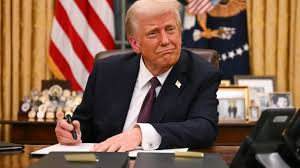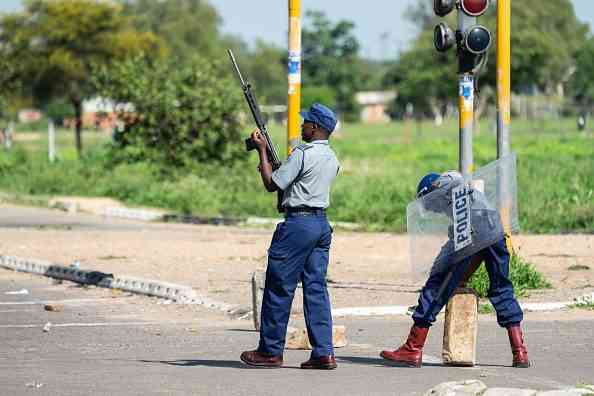
WINDHOEK, Namibia- A high-level regional dialogue on trade justice is set to take place in a hybrid format in Johannesburg, South Africa, today.
The dialogue comes in the wake of the United States’ recent announcement of sweeping reciprocal tariffs that are set to disproportionately affect economies in the Global South.
The summit will bring together approximately 50 influential participants from across the region to confront deepening structural inequalities in global trade, according to Masenate Molapo, the manager for the Standing Committee on Trade, Industry, Finance, and Investment (TIFI) programme of the SADC Parliamentary Forum, one of the organisers.
Running under the theme “Mitigating the Impact of US Reciprocal Tariffs on SADC Economies and Women and Girls,” the event seeks to challenge extractive economic models and offer a feminist, Pan-African vision for inclusive, sustainable trade.
The dialogue comes in the wake of US President Donald Trump’s announcement on April 2 of a 10% baseline tariff on all imports and reciprocal tariffs targeting regions like southern Africa.
Though a 90-day pause on SADC-targeted tariffs was announced on April 9, concerns remain high about their long-term implications for the region.
Organisers of the dialogue say these tariff measures are not just technical trade issues but about justice, sovereignty, and dignity.
Alice Kanengoni, the chief executive officer of the Southern Africa Trust, is expected deliver opening remarks and set the context for the dialogue.
- Zim headed for a political dead heat in 2023
- Record breaker Mpofu revisits difficult upbringing
- Tendo Electronics eyes Africa after TelOne deal
- Record breaker Mpofu revisits difficult upbringing
Keep Reading
The dialogue will bring together a broad coalition of stakeholders including trade economists, grassroots leaders, policymakers, feminist advocates, and civil society actors.
Notable participants include the Minister of Trade and Industry of Lesotho, Members of Parliament from South Africa, Botswana, Zimbabwe and Zambia, and representatives from SADC PF, the African Union AfCFTA secretariat, Southern and Eastern Africa Trade Information and Negotiations Institute (SEATINI), the Trade Law Centre (TRALAC), the European Judicial Network (EJN), WILSA, Southern African People’s Solidarity Network (SAPSN), The African Women’s Development and Communications Network (FEMNET), and Oxfam South Africa.
Renowned trade justice advocate Liepollo Lebohang is set to facilitate the dialogue which will feature keynote addresses and expert analyses exploring how the tariffs threaten livelihoods, especially for women-dominated sectors like textiles and informal cross-border trade.
Other resource persons are Rangarirai Machemedze and Mapule Maema. Machemedze is a seasoned policy analyst and advocate specialising in bilateral, regional, and multilateral trade agreements, with a strong focus on regional integration, sustainable development, and health policy. He currently serves as coordinator for the Southern and Eastern Africa Trade Information and Negotiations Institute (SEATINI Southern Africa), where he leads strategic engagement on trade policy and governance.
Maema is a development practitioner and business woman that champions women and youth’s economic empowerment, inclusive and innovative entrepreneurial ecosystems, agroecological food systems and resilient sustainable economic structures that prioritise people and the planet.
As a senior socio-economic policy advisor at the Economic Justice Network (EJN) of Fellowship of Christian Councils in East and Southern Africa (FOCCISA), Mapule leads transformative work at the intersection of trade, extractives, finance, food, climate, and socio-economic justice in Africa.
Despite mineral exports such as platinum, chrome, and manganese being exempt, the dialogue will highlight how these industries have historically marginalised women, caused ecological harm, and failed to deliver broad-based economic benefits.
According to the concept note shared ahead of the dialogue it will also examine the looming expiry of the African Growth and Opportunity Act (AGOA) in September 2025 and make a case for diversifying trade partnerships, promoting value addition, and strengthening intra-African trade through the African Continental Free Trade Area (AfCFTA).
Participants will engage in breakout sessions exploring feminist trade alternatives, strategies for supporting women-led enterprises, and leveraging AfCFTA to advance inclusive growth.
The sessions will culminate in the launch of a regional feminist trade justice framework, a living advocacy platform, and the development of a knowledge brief to contribute to ongoing AGOA renewal and AfCFTA implementation processes.
Expected outcomes include a regional feminist trade justice framework anchored in Afro-ecofeminist principles; Policy recommendations and advocacy demands for SADC institutions and AU engagements; and a knowledge brief capturing feminist economic analysis and grassroots voices.
The secretary-general of the SADC Parliamentary Forum, Boemo Sekgoma, will deliver a high-level address as the region faces growing economic headwinds and uncertain trade futures.










